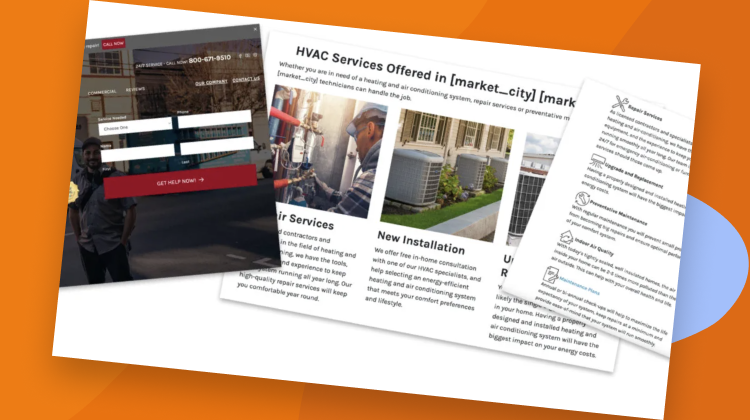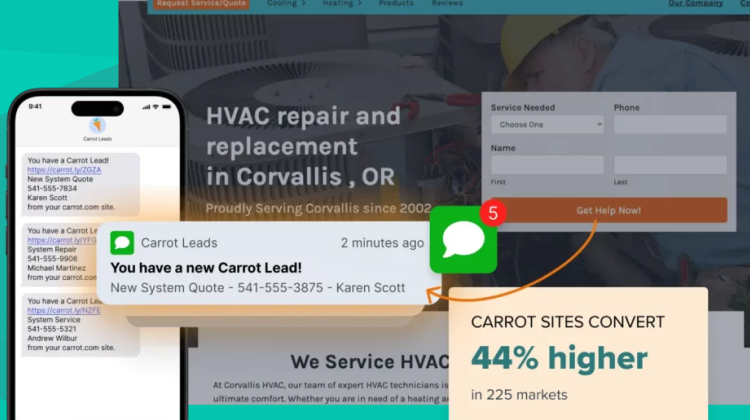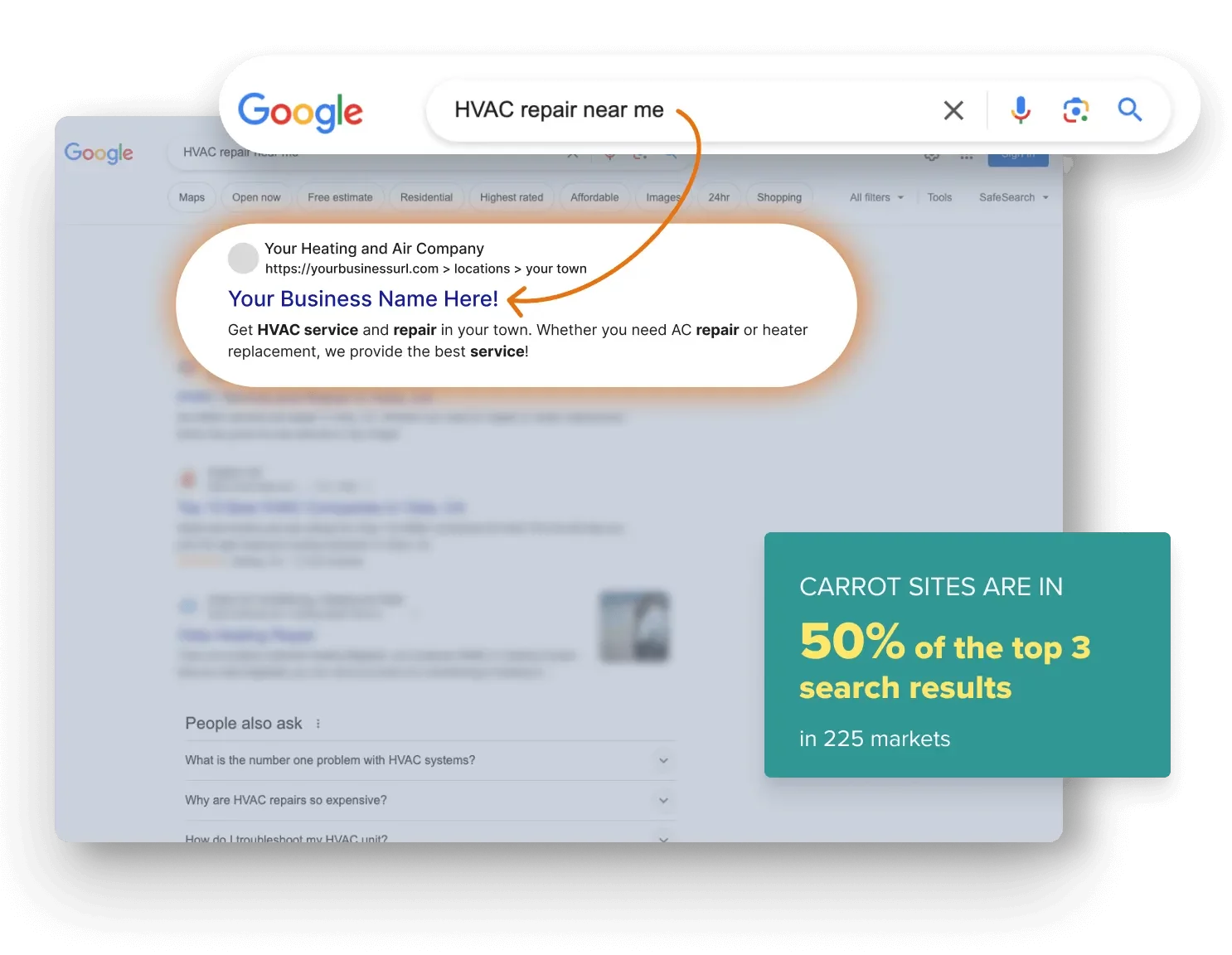
Why Organic Search Rankings Matter for HVAC Companies
Imagine a homeowner in the middle of a sweltering summer whose air conditioning suddenly fails. What’s their first move? They likely pull out their smartphone and search for “HVAC repair near me.”
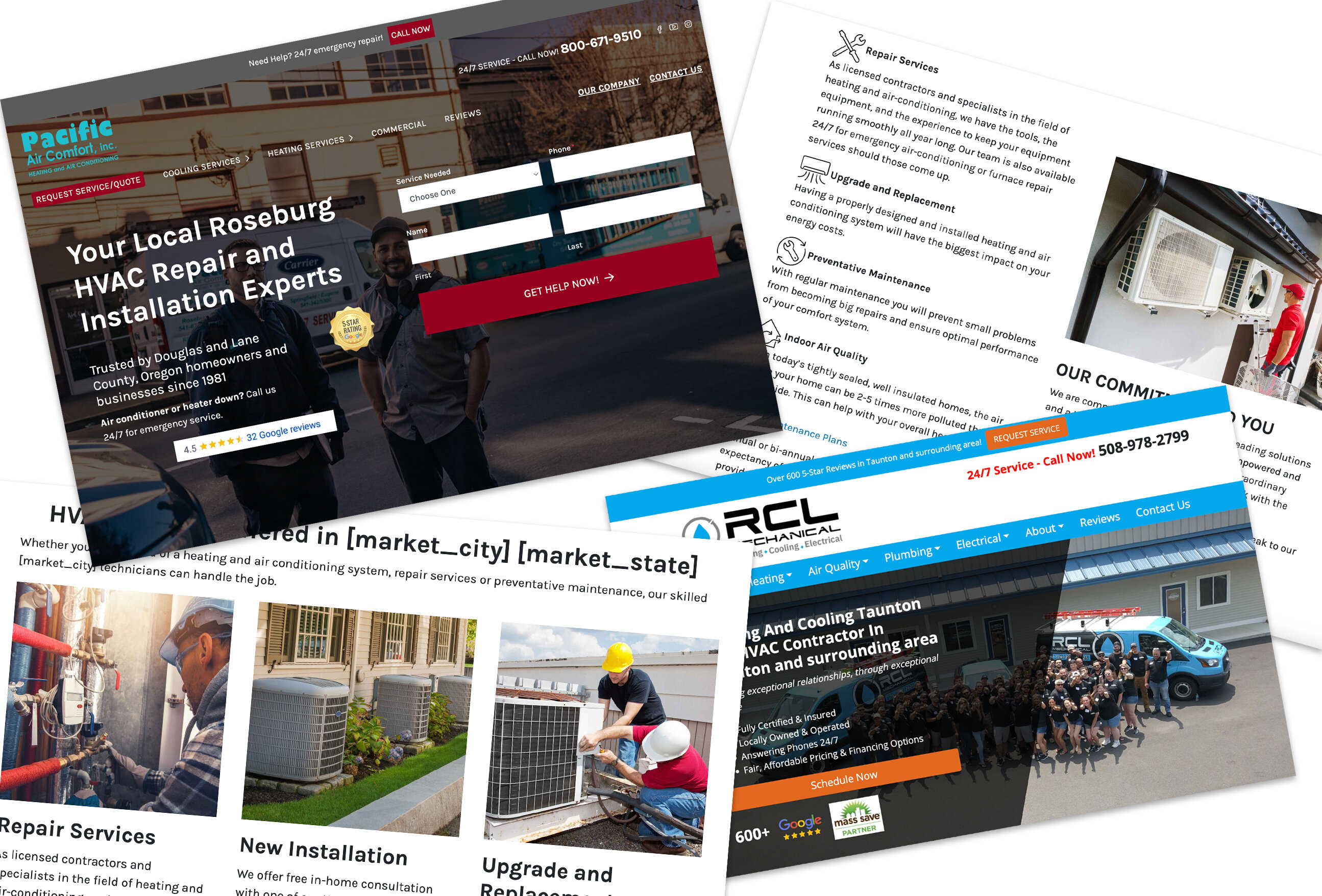
HVAC Websites: Get your HVAC website turning into more leads and clients…
Take a Free DemoThe companies at the top of the search results will most likely get the call. This underscores the critical importance of high organic search rankings for HVAC contractors. If your HVAC business isn’t showing up on the first page of search results, you’re missing out on potential leads and revenue. Organic search rankings are not just about visibility; they are a powerful driver of business growth.
SEO is no longer optional for HVAC companies; it’s a necessity. With thousands of potential customers searching for HVAC services online daily, standing out in the crowded market is crucial. SEO for HVAC ensures your services are prominently displayed when customers search, leading to increased website traffic, leads, and conversion rates. This guide provides actionable strategies for HVAC contractors to enhance their SEO, helping you tap into the vast online marketplace.
In this guide, you’ll learn the ins and outs of SEO tailored specifically for HVAC companies. We will cover everything from keyword research and on-page optimization to technical SEO and link-building strategies. By the end of this post, you’ll have a clear roadmap to improve your website’s organic search rankings.
Whether new to SEO or looking to refine your strategies, this guide will equip you with the tools and knowledge to increase your online visibility and grow your HVAC business.
Does your website check these 9 critical boxes?
Use our free HVAC Website Checklist to find out!
Table of Contents
- Section 1: Understanding the Basics of SEO for HVAC
- Section 2: Keyword Research for HVAC Services
- Section 3: On-Page SEO Strategies for HVAC Websites
- Section 4: Local SEO and Google My Business
- Section 5: Technical SEO for HVAC Websites
- Section 6: Link Building Strategies for HVAC Companies
- Conclusion
Improve Your HVAC Website Results
3.3 million leads and counting: now for HVAC companies! Our track record speaks for itself. Get ahead with exclusive early access!
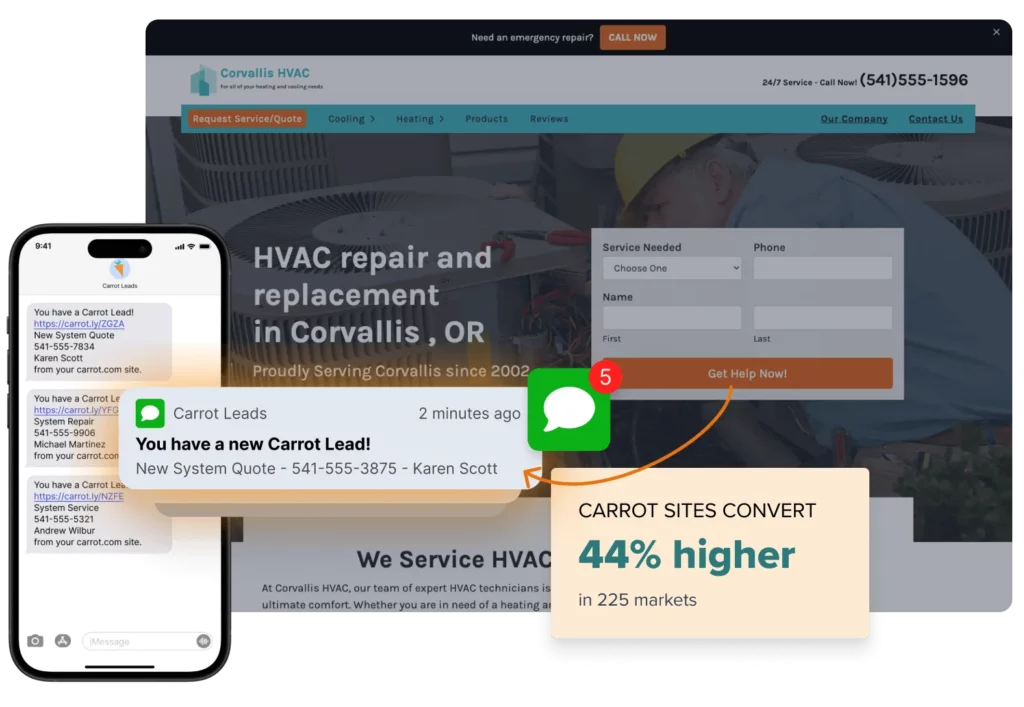
Understanding the Basics of SEO for HVAC
What is SEO?
SEO, or Search Engine Optimization, is the process of enhancing your website’s visibility on search engines like Google. For HVAC businesses, SEO is essential because it directly impacts how easily potential customers can find you online. By optimizing your HVAC website for search engines, you increase the chances of appearing at the top of search results when users look for HVAC services.
This visibility translates into more traffic, leads, and, ultimately, more business. Effective SEO for HVAC companies means leveraging your digital presence to attract customers who need your services.
Key Components of SEO
To maximize your HVAC company’s online visibility, it’s crucial to understand the three main components of SEO: on-page, off-page, and technical SEO.
- On-Page SEO:
- Content Quality: High-quality, relevant content is king. Ensure your content addresses common customer queries and incorporates HVAC keywords naturally, such as “HVAC repair” or “AC installation.”
To help you get started, use our Carrot Keyword Research + On-Page Optimization Worksheet. - Keyword Optimization: Use tools like Google Keyword Planner to find and integrate keywords your potential customers are searching for.
- Meta Tags: Optimize your title tags and meta descriptions to be concise and keyword-rich. For instance, your homepage might have a title tag like “Professional HVAC Services – [Your City] | Expert Repair & Installation.”
- Headers and Subheaders: Utilize H1, H2, and H3 tags to organize your content. This not only improves readability but also helps search engines understand the structure of your content.
- Content Quality: High-quality, relevant content is king. Ensure your content addresses common customer queries and incorporates HVAC keywords naturally, such as “HVAC repair” or “AC installation.”
- Off-Page SEO:
- Backlinks: Build a network of quality backlinks from reputable websites. This could include local business directories, industry associations, or satisfied customers.
- Social Media Presence: Engage with your audience on platforms like Facebook and LinkedIn. While social signals aren’t direct ranking factors, they contribute to your online visibility and brand authority.
- Customer Reviews: Encourage satisfied clients to leave positive reviews on platforms like Google My Business and Yelp. Reviews enhance your credibility and influence your rankings in local search results.
- Technical SEO:
- Page Speed: Ensure your website loads quickly. A slow site can deter visitors and negatively impact your search engine rankings.
- Mobile-Friendliness: With more searches conducted on mobile devices, a responsive design is essential. Google prioritizes mobile-friendly websites in its search results.
- Secure and Accessible Website: Make sure your site is secure (HTTPS) and easy for search engines to crawl and index. Tools like Google Search Console can help you monitor and resolve any issues.
By focusing on these key SEO components, HVAC contractors can increase their online visibility, attract more qualified leads, and grow their business.
Keyword Research for HVAC Services
Identifying Keywords
Effective keyword research is the backbone of a successful SEO strategy, especially for HVAC services. The right keywords ensure your content reaches the audience most likely to need your services. Here are some tips on identifying the best keywords for your HVAC business:
- Start Broad: Begin with general terms related to your services, such as “HVAC repair,” “air conditioning installation,” or “furnace maintenance.”
- Consider User Intent: Consider what potential customers are searching for at each journey stage. Are they looking for information or ready to schedule a service?
- Incorporate Location: Since HVAC services are localized, include region-specific terms like “HVAC repair in ” or “air conditioning installation in .” This helps target users searching for services in their area.
Tools for Keyword Research
Several powerful tools can help HVAC contractors uncover the most effective keywords to target:
- Google Keyword Planner: This free tool is a great starting point for discovering new keywords and seeing their search volume and competition level.
- SEMrush: A comprehensive tool that helps with keyword research and provides insights into your competitors’ keywords and strategies.
- Ahrefs: Offers a robust keyword explorer that can show you keyword difficulty, related keywords, and potential traffic estimations.
By utilizing these tools, you can refine your list of keywords to focus on those most relevant to your services and likely to drive traffic to your site.
Long-Tail Keywords
Long-tail keywords are longer, more specific keyword phrases that visitors are more likely to use when they’re closer to purchasing or booking a service. Here’s why they’re important for HVAC contractors:
- Higher Conversion Rates: Because they are more specific, long-tail keywords often increase conversion rates. For example, “emergency furnace repair in ” targets a specific need, likely leading to a quicker conversion.
- Less Competition: Long-tail keywords tend to have less competition, making ranking higher in search results easier.
- Better Targeting: These keywords help attract users looking for exactly what you offer, increasing the likelihood of turning visitors into customers.
Incorporating long-tail keywords into your SEO strategy can significantly boost your visibility for specific searches, drawing in more qualified leads ready to engage with your services.
On-Page SEO Strategies for HVAC Websites
Effective on-page SEO is crucial for HVAC websites looking to improve their search engine rankings and attract more organic traffic. Here are some key strategies for optimizing your HVAC website and enhancing its online visibility.
Title Tags and Meta Descriptions
Title tags and meta descriptions are the first elements potential customers see in search engine results, making them vital for driving clicks and engagement.
- Crafting Title Tags: Your title tags should be concise and descriptive and include your primary keyword, such as “SEO for HVAC.” Keep them under 60 characters to ensure they are fully displayed in search results. For example, “Expert HVAC Services—Reliable Repair & Installation in .”
- Writing Meta Descriptions: Meta descriptions should briefly summarize the page’s content and encourage users to click through. Aim for 150-160 characters, incorporating relevant keywords and a compelling call to action. For instance, “Need reliable HVAC services in ? Our experts offer fast and efficient repairs. Contact us today!”
Content Optimization
High-quality, relevant content is the cornerstone of successful SEO. It helps search engines understand your site’s relevance and engages your audience.
- Keyword Integration: Naturally incorporate your primary and secondary keywords throughout the content. For example, if discussing HVAC maintenance, phrases like “cooling services” or “air conditioning repair in ” should be seamlessly included.
- Readability: Break up the text with short paragraphs, bullet points, and subheadings. This makes the content easier for visitors to read and digest.
- Value-Driven Content: Address common questions and concerns of your audience, providing clear, actionable advice or solutions.
Image Optimization
Images enhance your website’s visual appeal and help convey your work’s quality. Optimizing them for SEO ensures they contribute to your site’s performance.
- Alt Tags: Use descriptive alt tags for all images, incorporating relevant keywords. For instance, “HVAC technician installing a new furnace in .”
- File Names: Rename image files to be descriptive and keyword-rich, like “hvac-installation-.jpg” instead of “IMG1234.jpg.”
- Compression: Compress images to reduce file size and ensure faster load times, which improves user experience and boosts SEO.
Internal Linking
Internal linking helps distribute page authority and assists search engines in understanding your site’s structure. It also enhances user navigation, encouraging visitors to explore more of your site.
- Link to Relevant Pages: Within your content, link to other relevant service pages or blog posts. For example, when mentioning AC repair, link to your dedicated air conditioning repair service page.
- Use Descriptive Anchor Text: The clickable text of your link should accurately describe the linked page’s content, making it clear to users and search engines what they can expect.
By implementing these on-page SEO strategies, HVAC contractors can improve their website’s search engine rankings, increase their visibility, and attract more potential customers.
Improve Your HVAC Website Results
3.3 million leads and counting: now for HVAC companies! Our track record speaks for itself. Get ahead with exclusive early access!

Local SEO for HVAC and Google Business Profile
Local SEO is a critical component of any HVAC contractor’s digital strategy. It ensures your business is visible to potential customers in your geographic area. Leveraging tools like Google Business Profile and maintaining consistent local citations can significantly boost your online presence. Here’s how to optimize your local SEO for HVAC services.
Claiming and Optimizing Google Business Profile
Google Business Profile is a free tool to manage your business’s appearance on Google Search and Maps. Here’s a step-by-step guide to setting up and optimizing your GBP listing:
- Claim Your Listing: Visit the Google Business Profile website and sign in with your Google account. Search for your business and claim it if it already exists. If not, create a new listing.
- Provide Accurate Information: Fill out all relevant business details, including your business name, address, phone number, and website URL.
- Choose Relevant Categories: Select the most appropriate categories for your business. For HVAC contractors, options might include “HVAC contractor,” “Air conditioning repair service,” or “Furnace repair service.”
- Add High-Quality Photos: Upload images of your team, equipment, and completed projects. High-quality photos make your listing more appealing and trustworthy.
- Encourage Customer Reviews: Ask satisfied customers to leave reviews on your GMB listing. Positive reviews improve your local search ranking and build trust with potential customers.
- Regularly Update Your Listing: Update your business hours, services, and contact information. Post updates about new services, promotions, or company news.
Local Citations and Reviews
Local citations mention your business’s name, address, and phone number on other websites and directories. They play a crucial role in local SEO.
- Ensure Accurate Listings: Consistent and accurate listings on local directories (like Yelp, Yellow Pages, and local chamber of commerce websites) help improve your local search rankings.
- Monitor and Respond to Reviews: Monitor reviews on platforms like Google, Yelp, and Facebook. Responding to positive and negative reviews shows you value customer feedback and are committed to excellent service.
- Encourage Positive Reviews: Implement strategies to encourage customer reviews, such as follow-up emails after service or incentives for leaving feedback.
NAP Consistency
NAP stands for Name, Address, and Phone number. Consistency in your NAP information across all platforms is vital for local SEO.
- Audit Your Listings: Regularly check your business listings on various online directories to ensure your NAP information is consistent.
- Update Incorrect Information: Correct any discrepancies in your business name, address, or phone number immediately to maintain consistency.
- Use a Standard Format: Adopt a standard format for your NAP information and use it across all listings and citations.
By focusing on local SEO and effectively utilizing Google My Business, HVAC contractors can enhance their visibility in local searches, attract more qualified leads, and build a strong reputation in their community.
Technical SEO for HVAC Websites
Technical SEO is the foundation that supports all other aspects of search engine optimization. Ensuring your HVAC website is technically sound will enhance user experience and improve search engine rankings. Here’s how to optimize your HVAC website from a technical standpoint.
Website Speed and Mobile-Friendliness
In today’s fast-paced digital world, users expect websites to load quickly and display correctly on all devices. Here’s why website speed and mobile-friendliness are crucial:
- Importance of Page Speed: A slow-loading website can frustrate users and increase bounce rates, negatively affecting your SEO. Use tools like Google PageSpeed Insights to assess and improve your website’s load time.
- Optimization Tips: Compress images, minimize CSS and JavaScript files, and leverage browser caching to enhance your site’s speed.
- Mobile Responsiveness: With most searches now conducted on mobile devices, having a mobile-responsive website is essential. Google favors mobile-friendly sites in search rankings.
- Responsive Design: Ensure your website adapts seamlessly to different screen sizes and devices. Test your site’s mobile responsiveness using Google’s Mobile-Friendly Test tool.
Structured Data and Schema Markup
Structured data helps search engines understand your website’s content better, which can enhance how your listings appear in search results.
- Schema Markup for HVAC Services: Implementing schema markup specific to HVAC services can provide search engines with detailed information about your services, location, and customer reviews.
- How to Implement: Use schema markup for local businesses, service offerings, and customer reviews to enhance search result snippets. Tools like Google’s Structured Data Markup Helper can assist in this process.
- Benefits: Proper schema markup can lead to rich snippets, which provide more information to users at a glance and can improve click-through rates.
Site Architecture
A well-structured site architecture is crucial for both user experience and SEO. It helps search engines crawl and index your site more efficiently.
- Intuitive Navigation: Design your site with a clear and intuitive navigation structure. Users should be able to find what they’re looking for within a few clicks.
- Navigation Tips: Organize your pages into logical categories and use descriptive labels for menu items. Implement a breadcrumb trail to help users understand their location within your site.
- Crawlable Structure: Ensure your site is easily crawlable by search engine bots. A clean and straightforward URL structure and an updated XML sitemap can aid in this process.
- XML Sitemaps: Create and submit an XML sitemap to search engines to help them discover your pages. Regularly update the sitemap to reflect any changes in your site’s structure.
By focusing on these technical SEO aspects, HVAC contractors can provide a seamless user experience and ensure their websites are well-positioned in search engine rankings.
Link Building Strategies for HVAC Companies
Link building is a crucial aspect of SEO, significantly influencing your website’s authority and search engine rankings. By securing quality backlinks, HVAC companies can improve their visibility and credibility online. Here’s how to build a robust link profile for your HVAC business.
Importance of Backlinks
Backlinks, or inbound links, are links from other websites that direct users to your site. They are a key factor in how search engines determine the authority and relevance of your site.
- Impact on SEO: High-quality backlinks from reputable sites signal to search engines that your content is valuable and trustworthy, which can boost your rankings. Conversely, low-quality or spammy backlinks can harm your SEO efforts.
- Quality Over Quantity: Focus on earning backlinks from high-authority domains within your industry. A few high-quality links are more beneficial than numerous low-quality ones.
Local Partnerships and Directories
Leveraging local business partnerships and online directories can provide valuable backlinks and enhance your local SEO.
- Local Business Partnerships: Collaborate with local businesses and industry partners to exchange backlinks. For example, you could write a guest post for a local hardware store’s blog, including a link back to your site.
- Online Directories: Ensure your HVAC business is listed on reputable online directories such as Yelp, Angie’s List, and the Better Business Bureau. These listings often include a link back to your site and can improve your local search visibility.
- Community Involvement: Participate in local events and sponsorships, and ensure these activities are mentioned on their respective websites with a link back to your business.
Guest Blogging
Guest blogging is an effective way to build backlinks while positioning yourself as an industry expert.
- Identify Opportunities: Look for industry-related websites, blogs, or online publications that accept guest contributions. Sites focused on home improvement, energy efficiency, or local business news are great places to start.
- Create Valuable Content: Write informative and engaging articles that provide real value to the readers. Incorporate your expertise and include a relevant link back to your HVAC website.
- Maintain Relationships: Build relationships with the site owners or editors. A good rapport can lead to more guest blogging opportunities and additional backlinks in the future.
By implementing these link-building strategies, HVAC contractors can enhance their online authority, improve their search engine rankings, and attract more customers.
Conclusion
Optimizing your HVAC business for search engines is essential to running a successful HVAC SEO campaign, increasing your online visibility, and attracting more qualified leads. Throughout this guide, we’ve covered the key aspects of SEO for HVAC businesses.
- Understanding SEO Basics: Recognizing the key components of on-page, off-page, and technical SEO and their importance in improving your HVAC website’s performance.
- Keyword Research: Using tools and strategies to identify relevant and high-converting keywords that resonate with your target audience, including long-tail and localized terms.
- On-Page SEO Strategies: Crafting compelling title tags, optimizing content and images, and creating a robust internal linking structure.
- Local SEO for HVAC and Google My Business: Enhancing your local search presence by optimizing your GMB listing, maintaining NAP consistency, and leveraging local citations and reviews.
- Technical SEO: Ensuring a fast, mobile-responsive website with a clear site structure and proper schema markup.
- Link Building Strategies: Building a strong backlink profile through local partnerships, directory listings, and guest blogging opportunities.
Implementing these strategies can significantly improve your HVAC business’s online presence, driving more organic traffic and potential customers to your site. Start applying these techniques today, or seek professional SEO assistance to maximize your results.
Further Resources
For more information on SEO strategies and services tailored to HVAC contractors, visit Carrot.com. Our team specializes in helping HVAC businesses thrive online through proven SEO practices and cutting-edge digital marketing solutions.

